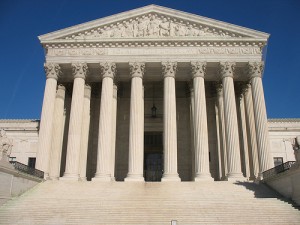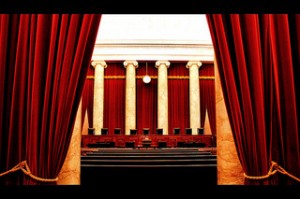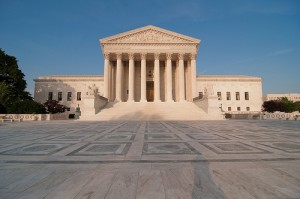More specifically, in CRST Van Expedited v. EEOC the Supreme Court ruled employers who prevail in Title VII employment discrimination cases may recover attorney’s fees if they are able to “rebuff” employee’s claims for any reason—including reasons not related to the merits of the claims. Continue reading
Archives
Mistaken Beliefs May Mean Constitutional Claims
Bad facts make bad law. That said, it is hard to imagine a case sympathetic to a public employer where it discharged or dismissed an employee based on its incorrect belief that the employee engaged in constitutionally protected speech. Either way, the case the Supreme Court heard, and ruled against the public employer in, involved a son helping his bedridden mother.
In Heffernan v. City of Paterson, New Jersey the Supreme Court held 6-2 that a public employer violates the First Amendment when it acts on a mistaken belief that an employee engaged in First Amendment protected political activity. The State and Local Legal Center (SLLC) filed an amicus brief taking the opposite position. Continue reading
Constructive Discharge: When You Quit or are Last Treated Badly?
If not all Supreme Court cases are equal, all employment law Supreme Court really cases aren’t equal. Green v. Donahoe isn’t Ledbetter v. Goodyear, holding employees have 180 days from a discriminatory pay decision to bring a claim, which Congress promptly overturned. Most employers won’t care how this case is decided. So, why did the Court take it? Likely to resolve a circuit split that has been brewing for the last 25 years.
In Green v. Donahoe the Supreme Court will decide for purposes of federal employment discrimination law when the filing period for a constructive discharge claim begins to run. The Court’s choices are: when an employee resigns or the employer’s last allegedly discriminatory act. Often these two events occur at the same time, but not in this case.
This case will apply to constructive discharge claims brought against state and local government employers under Title VII, the Americans with Disabilities Act, and the Age Discrimination in Employment Act, all of which must first be brought to the attention of the EEOC before a court. Continue reading
Supreme Court Long Conference Results Are In!
Last Monday’s Supreme Court “long conference” did not disappoint. The Supreme Court granted a total of 11 petitions. At least four of those cases are relevant to local government.
At least four of those cases are relevant to local government.
Housing discrimination. For the third time the Court has accepted a case involving this issue of whether disparate-impact (as opposed to disparate treatment) claims can be brought under the Fair Housing Act (FHA). It remains to be seen if Texas Department of Housing and Community Affairs v. The Inclusive Communities Project will settle like its predecessors, Mt. Holly v. Mt. Holly Citizens in Action and Magner v. Gallagher. The 11 federal circuits that have decided this issue have all held that disparate-impact claims are actionable. The Supreme Court is expected to rule to the contrary. Local government have been sued for disparate impact under the FHA and have sued other entities.
Fourth Amendment search. In its second Fourth Amendment case of the term, Rodriguez v. United States, the Court will decide whether a police officer violates the Fourth Amendment by extending (for just a few minutes) an already-completed traffic stop for a dog sniff. The Eighth Circuit held the search in this case was reasonable. The police officer waited seven or eight minutes after the traffic stop was completed before deploying his sniffer dog because he wanted backup given that there were two people in the stopped car.
Employment discrimination. Continue reading
Supreme Court and Local Governments: What Will the Court Accept Next?
While the Supreme Court’s next term officially begins on October 6, its “long conference” is September 29. At this conference the Court will review a backlog of petitions that have been piling up over the summer. SCOTUSblog complies a list of petitions that it thinks have a reasonable chance of being granted. Eight of the petitions the Court will consider either during the “long conference” or at a later conference directly involve or impact local governments.
Public nuisance. A Brighton, Michigan, ordinance presumes that an unsafe structure will be demolished as a public nuisance if the cost of repairing it exceeds its value. The owner has no right to repair the structure. Brighton property owners wanted to repair two unsafe structures even though Brighton estimated it would cost almost double the property value do so. In Bonner v. City of Brighton, Michigan, the property owners claim the ordinance violates substantive and procedural due process.
Employment. Under federal employment law to bring a discrimination claim a plaintiff must prove that an “adverse action” occurred, and to bring a retaliation claim a plaintiff must prove a “materially adverse action” occurred. The question in Kalamazoo County Road Commission v. Deleon is whether either can be proven when an employer grants an employee’s request for a job transfer (and the new position turns out to be less desirable than the old position). The International Municipal Lawyers Association (IMLA) filed an amicus brief in this case. Continue reading
Monday Morning Review: Local Governments in the Federal Appellate Courts
Here are last week’s published decisions involving local governments:
Sixth Circuit
Hescott v. City of Saginaw, No. 13-2103 (July 2, 2014) (ruling that district court erred denying attorney’s fees to Hescotts in their successful 1983 action claiming that the City had unconstitutionally seized their personal effects by demolishing their property).
Seventh Circuit
Scherr v. City of Chicago, No. 13-1992 (July 2, 2014) (affirming that 1983 suit against officer based on alleged Fourth-Amendment violation was properly dismissed). Continue reading
Is Terminating an Employee for His Job-Performance-Related Testimony a Constitutional Violation?
That question arises in Lane v. Franks, No. 13-483, a Supreme Court case in which IMLA and the International Public Management Association have now filed a brief.
The Eleventh Circuit ruled that the termination did not trigger First-Amendment scrutiny:
No one disputes that Lane was acting pursuant to his official duties as CITY’S Director when he investigated Schmitz’s work activities, spoke with Schmitz and other CACC officials about Schmitz’s employment, and ultimately terminated Schmitz’s employment. That Lane testified about his official activities pursuant to a subpoena and in the litigation context, in and of itself, does not bring Lane’s speech within the protection of the First Amendment. Continue reading
Ninth Circuit: Officer Removed After Raising Safety Issues Does Not Have First Amendment Claim.
If a public employee reports departmental-safety concerns to his supervisor, and the employee is removed from duty for raising those concerns, does the employee have a viable First Amendment retaliation claim?
In Hagen v. City of Eugene, No. 12-35492 (Dec. 3, 2013), the Ninth Circuit ruled that a public employee did not have a viable First Amendment claim under the particular circumstances there. The court ruled that, viewing all the evidence in the light most favorable to the employee, he was speaking as a public employee, not a private citizen.
The case involved a City police officer, Brian Hagen, who noticed that members of his SWAT team were often firing their weapons accidentally and negigently. Hagen tried to make his concerns about the team “as public as possible” by sending e-mails and raising the issue in meetings. Eventually, Hagen was removed from the K-9 team.
Hagen claimed that the City and senior officers had retaliated against him for exercising his First Amendment rights. Continue reading
